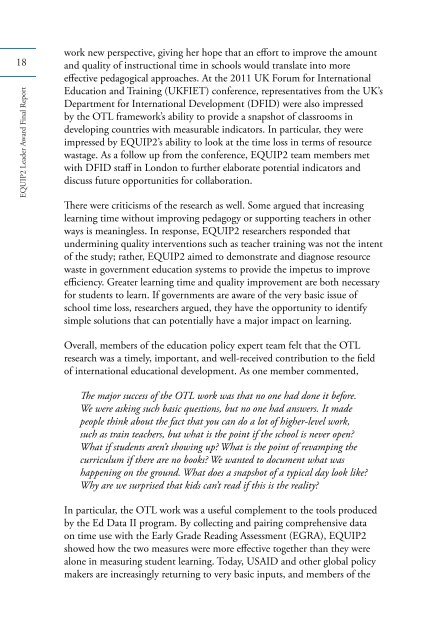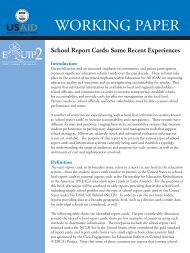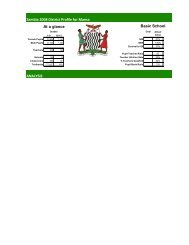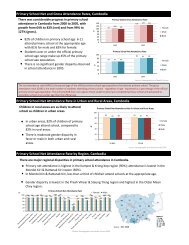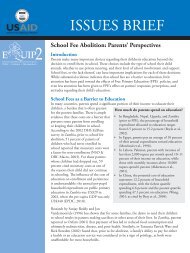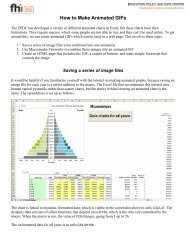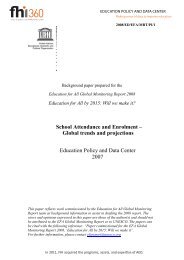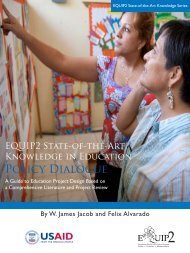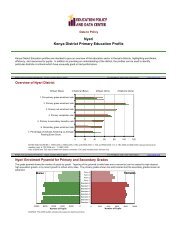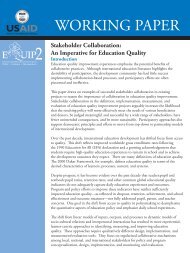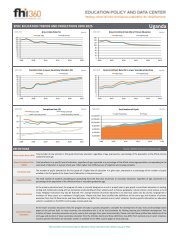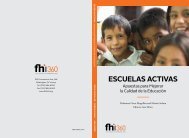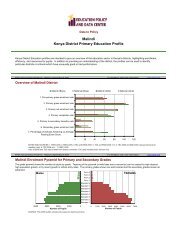EQUIP2 Final Report.pdf - Education Policy Data Center
EQUIP2 Final Report.pdf - Education Policy Data Center
EQUIP2 Final Report.pdf - Education Policy Data Center
Create successful ePaper yourself
Turn your PDF publications into a flip-book with our unique Google optimized e-Paper software.
18<br />
<strong>EQUIP2</strong> Leader Award <strong>Final</strong> <strong>Report</strong><br />
work new perspective, giving her hope that an effort to improve the amount<br />
and quality of instructional time in schools would translate into more<br />
effective pedagogical approaches. At the 2011 UK Forum for International<br />
<strong>Education</strong> and Training (UKFIET) conference, representatives from the UK’s<br />
Department for International Development (DFID) were also impressed<br />
by the OTL framework’s ability to provide a snapshot of classrooms in<br />
developing countries with measurable indicators. In particular, they were<br />
impressed by <strong>EQUIP2</strong>’s ability to look at the time loss in terms of resource<br />
wastage. As a follow up from the conference, <strong>EQUIP2</strong> team members met<br />
with DFID staff in London to further elaborate potential indicators and<br />
discuss future opportunities for collaboration.<br />
There were criticisms of the research as well. Some argued that increasing<br />
learning time without improving pedagogy or supporting teachers in other<br />
ways is meaningless. In response, <strong>EQUIP2</strong> researchers responded that<br />
undermining quality interventions such as teacher training was not the intent<br />
of the study; rather, <strong>EQUIP2</strong> aimed to demonstrate and diagnose resource<br />
waste in government education systems to provide the impetus to improve<br />
efficiency. Greater learning time and quality improvement are both necessary<br />
for students to learn. If governments are aware of the very basic issue of<br />
school time loss, researchers argued, they have the opportunity to identify<br />
simple solutions that can potentially have a major impact on learning.<br />
Overall, members of the education policy expert team felt that the OTL<br />
research was a timely, important, and well-received contribution to the field<br />
of international educational development. As one member commented,<br />
The major success of the OTL work was that no one had done it before.<br />
We were asking such basic questions, but no one had answers. It made<br />
people think about the fact that you can do a lot of higher-level work,<br />
such as train teachers, but what is the point if the school is never open?<br />
What if students aren’t showing up? What is the point of revamping the<br />
curriculum if there are no books? We wanted to document what was<br />
happening on the ground. What does a snapshot of a typical day look like?<br />
Why are we surprised that kids can’t read if this is the reality?<br />
In particular, the OTL work was a useful complement to the tools produced<br />
by the Ed <strong>Data</strong> II program. By collecting and pairing comprehensive data<br />
on time use with the Early Grade Reading Assessment (EGRA), <strong>EQUIP2</strong><br />
showed how the two measures were more effective together than they were<br />
alone in measuring student learning. Today, USAID and other global policy<br />
makers are increasingly returning to very basic inputs, and members of the


